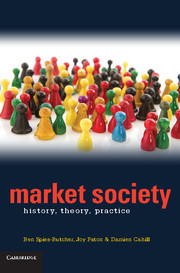Book contents
- Frontmatter
- Contents
- Acknowledgements
- 1 Introducing market society
- Part 1 Constituting market society
- Part 2 Regulating market society
- Part 3 Living market society
- 8 Work, consumption and quality of life
- 9 Family, environment and sustainability
- 10 Civil society, community and participation
- Concluding remarks
- References
- Index
10 - Civil society, community and participation
from Part 3 - Living market society
Published online by Cambridge University Press: 05 June 2012
- Frontmatter
- Contents
- Acknowledgements
- 1 Introducing market society
- Part 1 Constituting market society
- Part 2 Regulating market society
- Part 3 Living market society
- 8 Work, consumption and quality of life
- 9 Family, environment and sustainability
- 10 Civil society, community and participation
- Concluding remarks
- References
- Index
Summary
IN THIS THIRD part of the book we have discussed how market society is experienced. We examined the world of work and consumption and areas of life that are often seen as ‘outside’ the economy, even though they support its reproduction. In this chapter we focus on civil society. Unlike families, work and the natural environment, which existed in various forms prior to the development of capitalism, many view civil society as a uniquely modern development – but one that provides a space outside the bureaucratic imperatives of the state and the profit motive of the market. It is a space where values are formed, debated and contested and, therefore, where the very operation of market society itself is shaped.
However, the nature and significance of civil society and its relationship to the capitalist economy is contested. In this chapter we explore three different understandings of civil society and how such ideas can be applied to different contemporary debates: first, the classical liberal perspective oriented around free exchange between individuals; second, the model built by social liberals and communitarians which focuses on social cohesion and building community; and, third, a perspective developed by critical theorists which views civil society as a place of conflict and struggle over the values and organisation of society. We also consider the role of social movements, the changing nature of participation and the relatively recent trend of transferring welfare responsibilities from the state to civil society.
- Type
- Chapter
- Information
- Market SocietyHistory, Theory, Practice, pp. 214 - 237Publisher: Cambridge University PressPrint publication year: 2012



